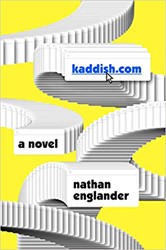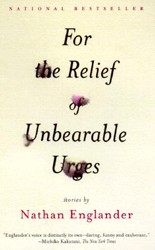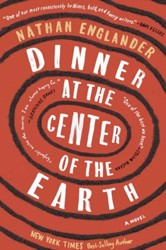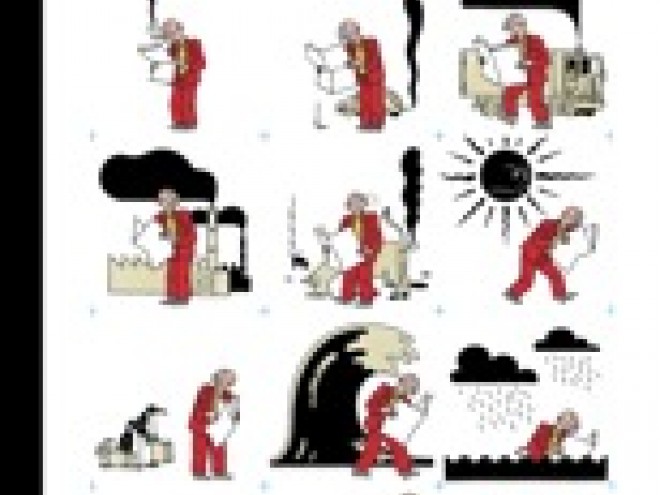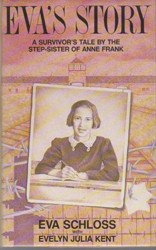Some readers mistake fiction for an allegory of current events, the prose counterpart to a political cartoon. Nathan Englander, a master of short fiction, writes about West Bank settlers and Orthodox families, the Holocaust and mixed marriages, but not to editorialize about them. His real subjects are memory, obsession, choices, and consequences.
His characters’ actions defy easy judgments. In “How We Avenged the Blums,” yeshiva boys are taunted, humiliated, and attacked by a bully they call The Anti-Semite. “Our parents thought us soft,” the narrator confesses, and the tension between the boys’ gentleness and their need to defend themselves shapes a parable about justice and mercy. At “Camp Sundown,” a summer camp for seniors, the young director can’t understand why a group of Holocaust survivors feels sure that a gentle new camper had been a guard at a concentration camp. As in any tragedy they each do what they must, and the story closes with a breathtaking image of inexorability.
Forgiveness and retribution lie at the heart of “Free Fruit for Young Widows.” A fruit vendor in Jerusalem’s Mahane Yehudah market often gives away produce to a man named Tendler, who had pummeled the fruitseller severely when they both were soldiers. Explaining himself to his son, the vendor recounts two life-or-death decisions that Tendler was forced to make. When the young man, full of certainties, pronounces Tendler the guilty party, the father can only ask, “And whoever are we, my son, to decide who should die?”
Reality dissolves into dreams in the stunning and strikingly original “Peep Show” when a successful lawyer finds himself drawn into a tawdry exhibition of female flesh in Times Square. An assimilated Jew, faithful to his blond Gentile wife, he can’t resist the temptation to stay and stare at the women on display. When his mind drifts to his rebbes from yeshiva days, visions of past and present collide. As when he was a boy, guilt vies with desire, especially the desire for approval and acceptance.
Two of these stories probe the need to write. The narrator of “Everything I Know About My Family on My Mother’s Side,” prompted by his girlfriend, spends sixty-three numbered paragraphs telling stories, mostly about his grandfather and his great-uncles. For the narrator — “me, fictionalized,” the fictive author explains — being able to tell stories about what matters most to him is what makes relationships possible.
The astonishing story “The Reader” finds a once-celebrated novelist driving from city to city to give readings from his new book. Once his appearances were major events; now he is lucky if anyone shows up at the scenes of his past triumphs. “How much richer could a writing life be than finding, even for one night, one true reader?” he rationalizes to himself, making the best of what he feels is the end of his career. He soon discovers that things are not quite what they seem, and the motives of one “true reader” are anything but simple.
The title story brings together two couples who could be stereotypes: Jews in a Florida suburb and a couple who moved to Israel after becoming ultra-Orthodox. It turns out that one of the Floridians is preoccupied with the Holocaust and the Hassidic couple has a fondness for marijuana, a combination that leads step by step to an unforeseen, shattering realization.
Englander’s voice changes markedly in “Sister Hills.” For this mythic narrative he sets aside colloquial dialogue and textured narrative in favor of spare, elliptical language reminiscent of the Hebrew Bible. Matriarch Rena Cohen is one of the founders of a West Bank settlement, her life visited repeatedly by tragedy as the settlement grows into a thriving town. She is a model of selflessness and fortitude until her life becomes unbearable, and for once she uses her formidable intelligence and determination to get something for herself — with tragic consequences for others.
Superficial readers may find trite lessons about settlers and Palestinians, war and peace, prejudice and tolerance, or legalism and empathy in this story, but that would miss the point. In Nathan Englander’s eyes, human beings make choices for admirable and regrettable reasons, with good and bad outcomes. His compelling storytelling, his compassion, and his startling originality make Englander an essential writer. This collection confirms his exceptional talents yet again, and it is not to be missed.
Justice, Chaos, Sincerity: Talking with Nathan Englander
by Bob Goldfarb
During his book tour in February, the author of What We Talk About When We Talk About Anne Frank spoke to Bob Goldfarb by phone from San Francisco.
Bob Goldfarb: One theme that recurs in your stories is justice and revenge. It happens with characters like Prof. Tendler in “Free Fruit for Young Widows,” the older campers in “Camp Sundown,” and the kids in “How We Avenged the Blums.”
Nathan Englander: It didn’t cross my mind as revenge. I’m 42 and I can’t get over the fact that the world is unfair, unjust, hypocritical, and duplicitous. When the world doesn’t deliver justice, what do you do? What would I do? What would other people do? It’s an exploration of the gray with each character.
BG: Some of your characters seem to believe one thing and do another.
NE: We’re all stumbling through the world, and what interests me is exploring that. In “Sister Hills” it’s the idea of contracts, holding people to their word. People start with clear reasons for their actions – the Bible, the Constitution – and end up doing what amounts to the opposite of those principles. I’m interested in social contracts and responsibilities to the community and decisions. Living with other human beings raises big questions with big answers.
BG: That particular story deals with settlers on the West Bank.
NE: I’m obsessed with the complexities of settlers. History unfolds in the acts of individuals. People are just human beings, but they think they have a bigger plan. They change fate and unleash forces they can’t handle. It’s almost Shakespearean. It’s the chaos theory of the world, and it petrifies me.
BG: Some of these stories have dissimilar narrative voices, almost as if they were written by different authors.
NE: As I write each story I can hear its rhythm and feel the language, even as I’m conscious of the development and structure and execution. It amounts to building a world that has to be as real as the one we’re in. At some point in the development of any story it comes alive and it makes it own demands. A different world needs its own voice.
BG: Your stories can inspire very conflicting interpretations among readers.
NE: Every read is a correct read. My point is about sincerity. There’s hardly anything more sincere than people trying with all their hearts to put their work in the world. If they don’t see it, that’s life.
Bob Goldfarb is President Emeritus of Jewish Creativity International.


